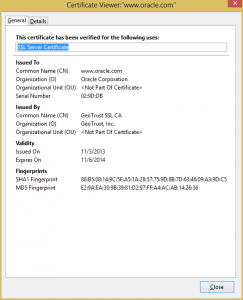

Any pre- existing keystore or wallet that you wish to use must be imported using either Fusion Middleware Control or the WLST utility. For details, see Section 7.4.4.5.1 and Section 7.4.4.5.2.Ĭopying Keystores to File System Not SupportedĬreating, renaming, or copying keystores directly to any directory on the file system is not supported. Specifically for Oracle HTTP Server, if a wallet was created using orapki, in order to view or manage it in Fusion Middleware Control you must first import it with either Fusion Middleware Control or the WLST importWallet command. If an Oracle wallet was created with tools such as orapki, it must be imported prior to use. Using a Keystore Not Created with WLST or Fusion Middleware Control You cannot use Fusion Middleware Control or the WLST command-line tool to import DER-encoded certificates or trusted certificates into an Oracle wallet. WLST, a command-line interface for JKS keystores and Oracle walletsįusion Middleware Control, a graphical user interface Oracle Fusion Middleware provides these options for keystore operations: As of Oracle Fusion Middleware 12 c (12.1.3), you can take advantage of the central storage and unified management available with the Keystore Service to manage wallets and their contents through the export, import, and synchronization features of that service. Oracle Wallets are used for Oracle HTTP Server. Such a wallet is called a third-party wallet.Įither the test wallet or the third-party wallet may be password-protected, or may be configured to not require a password, in which case it is called an auto-login wallet. Once the CA sends the certificate back, it is imported into the wallet. Such a wallet is called a test wallet and is typically used in development and testing phases.Ĭreate a certificate request, so that you can request a signed certificate back from a Certificate Authority (CA). Pre-populate it with a self-signed certificate. Oracle wallets can be auto-login or password-protected wallets. You can store Oracle wallets on the file system or in LDAP directories such as Oracle Internet Directory. An Oracle wallet is a container that stores your credentials, such as certificates, trusted certificates, certificate requests, and private keys.


 0 kommentar(er)
0 kommentar(er)
